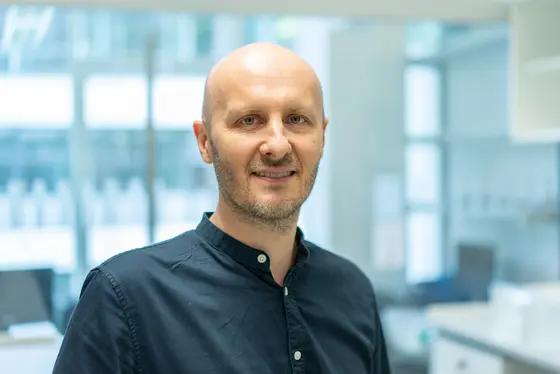Wilhelm Palm has been awarded this year's Hella Bühler Prize - which comes with prize money of 100,000 euros - for his groundbreaking research on cancer metabolism. The award, granted by Heidelberg University, is intended for young researchers from Heidelberg science institutions who have already drawn attention to themselves through outstanding scientific quality in cancer research. Wilhelm Palm heads the DKFZ's junior research group Signal Transduction and Metabolism of the Cell and is a member of the DKFZ-ZMBH Alliance.
With his team, Palm studies how cancer cells tap alternative sources of nutrients to grow uncontrollably and thrive in nutrient-poor tumor environments. The goal of his work is to identify weak points in cancer metabolism that can potentially be exploited in cancer therapy. For example, malignant tumors are often poorly connected to the blood supply, so cancer cells often suffer from nutrient deficiencies. Under these conditions, they must ensure their survival by switching to alternative food sources such as proteins. Wilhelm Palm's team was able to identify a protein that enables cancer cells to make this switch. This discovery could point to a way to specifically starve cancer cells.
Wilhelm Palm received his PhD in 2011 from the Max Planck Institute of Molecular Cell Biology and Genetics and the Technical University of Dresden with a thesis on the complex interplay between metabolism, nutrition and organismal development. He then conducted postdoctoral research at the Memorial Sloan Kettering Cancer Center in New York. In 2017, the biochemist moved to the DKFZ as a junior research group leader.
Almut Schulze, Head of the Division “Tumor Metabolism and Microenvironment“ at DKFZ, gave the laudatory speech for the award winner.
The research prize, endowed by the Heidelberg dentist Hella Bühler (1910 to 2002), is aimed at young scientists at Heidelberg University or young researchers who are associated with the Ruperto Carola in scientific cooperation. The award is intended to support the award winners at an early stage of their careers in continuing and deepening their already outstanding work in the field of cancer research. It is awarded by the university and is one of the highest endowed awards in the field of cancer research in Germany.



